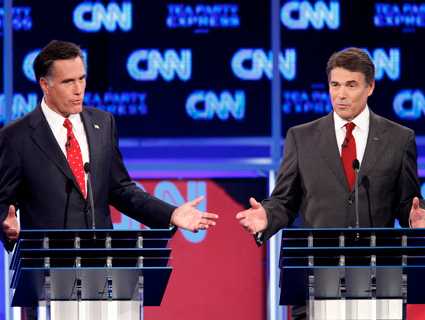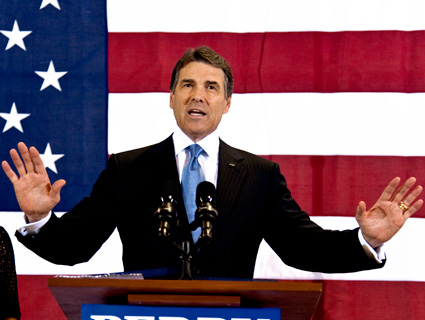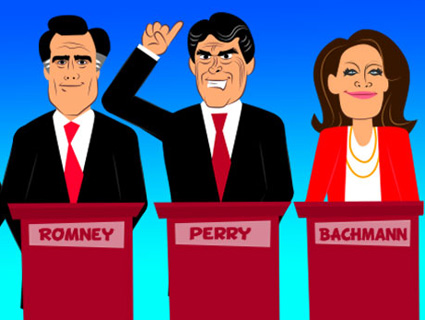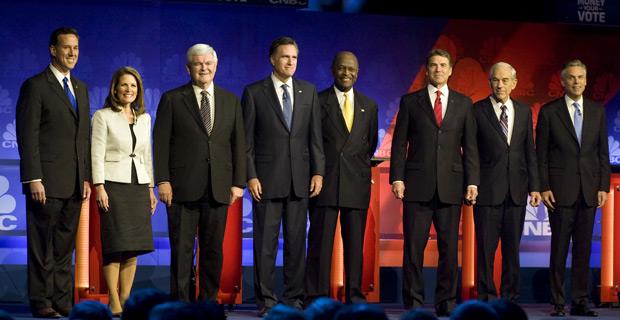 The eight 2012 GOP presidential candidates at the CNBC debate on November 9, 2011 Mark Bialek/Zuma Press
The eight 2012 GOP presidential candidates at the CNBC debate on November 9, 2011 Mark Bialek/Zuma Press
Read on for the Mother Jones news team’s instant analysis of Wednesday night’s GOP presidential debate at Oakland University in Michigan.
Quote of the Night, Rick Perry Edition: “Oops.”
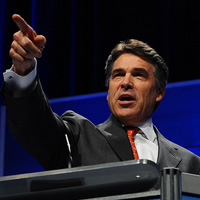 Gov. Rick Perry/Flickr
Gov. Rick Perry/Flickr
A few weeks back, Rick Perry’s presidential campaign floated a daring idea: Acknowledging that debates aren’t really his thing, the Texas governor would consider skipping any future GOP candidate confabs. It seemed like an act of desperation, but given his performance on stage in Michigan on Wednesday, it might have been a good idea.
Perry’s shining moment, the one that will likely live on long past Perry’s candidacy, came when he was asked to provide specifics on how he would fix Washington’s business climate. He started strong: “When I get there there’ll be three agencies I’ll end: commerce, education…”
So far, so good. Except Perry’s answer ended there. He grasped, visibly struggling, for the third agency on his list and couldn’t come up with it. Rep. Ron Paul (R-Texas) jumped in, helpfully, to offer that there were actually five agencies that should be abolished, and mentioned the EPA. Perry thought that sounded right, but then reconsidered, noting that he was pretty sure he thought the EPA should be rebuilt, not abolished.
CNBC’s John Harwood asked Perry to clarify. Could he name the third agency he’d abolish?
“No,” Perry said. Long pause. “Oops.”
The answer, it turns out, is “Energy.” Leave your jokes in the comments.
Romney: Obama Wants to Eat the Rich
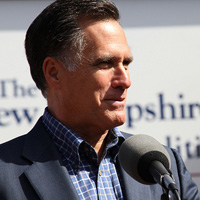 Mitt Romney/Flickr
Mitt Romney/Flickr
During the CNBC debate, “Mad Money” host Jim Cramer asked the candidates if they believe corporations have a social obligation to create jobs, or if—citing Milton Friedman—corporations exist solely to produce returns for shareholders.
Mitt Romney responded to what he called “an interesting philosophical” question by stating that “you don’t have to decide between the two [because] they go together!” That may be all well and good (well, maybe not quite…), but his response jumped the shark right after he embraced the popular conservative talking point about how Democrats “think when corporations are profitable, it’s a bad thing.”
Romney went on to lambaste President Obama’s alleged attitude toward corporate profits, insisting that “we have a president and an administration that doesn’t like business…I like jobs!”
The “Obama wants to murder your business” meme is wholly self-discrediting. In the real world, Barack Obama hates rich businessmen so much that he oversaw the staggering resurgence of Wall Street’s prosperity. He is so against big business that his administration pushed the government intervention that preserved America’s auto giants. And he is so hostile towards the financial sector that his 2012 campaign has raked in more money from its employees than all of the Republican candidates combined.
Cain Walks Back “Princess Nancy”
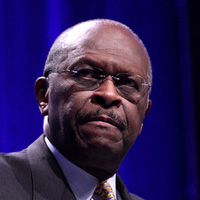 Gage Skidmore/Flickr
Gage Skidmore/Flickr
During Tuesday night’s Republican debate on CNBC, Herman Cain referred to former House Speaker Nancy Pelosi as “Princess Nancy” while criticizing her for killing a Republican health care proposal when Democrats were in control of Congress. The GOP debate audience laughed and applauded.
In a brief post-debate interview, in response to a question from CNBC anchor Carl Quintanilla, Cain walked back his “Princess Nancy” remark saying, “That is a statement I probably should not have made.” His campaign however, was proud enough of the line that they repeated it on his official Twitter feed:
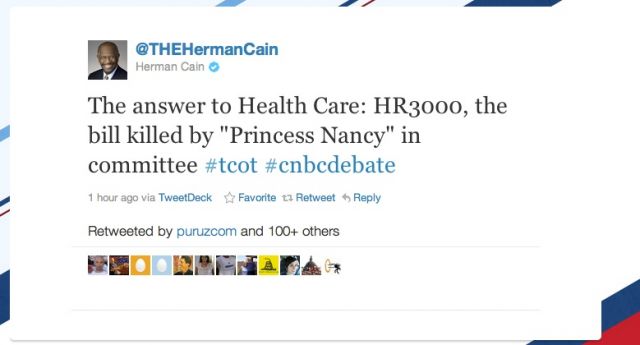
The speaker of the House is second in line for the presidency of the United States, should the president and vice president become incapacitated.
Newt’s Freddie Mac Lobbying Whopper
 Former Speaker Newt Gingrich (bottom right) and the elephant in the room Courtesy of Gingrich Productions
Former Speaker Newt Gingrich (bottom right) and the elephant in the room Courtesy of Gingrich Productions
At Wednesday night’s GOP presidential debate in Michigan, Newt Gingrich was asked by the mostly on-the-ball CNBC panel about his work on behalf of housing giant Freddie Mac. For the former speaker of the House, it was a bit of a welcome-back moment; for the last few months, he’s been so much of an afterthought that moderators haven’t even bothered with his own personal history and résumé.
But Gingrich had an answer ready. He denied the lobbying charge, and then, via Benjy Sarlin, offered this spirited defense:
I offered advice. My advice as an historian when they walked in and said we are now making loans to people that have no credit history and have no record of paying back anything but that’s what the government wants us to do. I said at the time, this is a bubble. This is insane. This is impossible. It turned out unfortunately I was right and the people who were doing exactly what Congresswoman Bachmann talked about were wrong.
It’s pretty self-evident, though, that Gingrich wasn’t hired as a consultant because he was an untenured history professor at North Georgia College in the late 1970s. He was hired because, as a former speaker of the House, he had a lot of influence with a lot of imporant people. An AP investigative report from 2008 framed Gingrich’s role as that of a political operator, greasing the wheels on Capitol Hill. Key section:
Efforts to tighten government regulation were gaining support on Capitol Hill, and Freddie Mac was fighting back.
According to internal Freddie Mac documents obtained by the AP, Reps. Bob Ney (R-Ohio), and Paul Kanjorski (D-Pa.) spent the evening in hard-to-obtain seats near the Nationals dugout with Freddie Mac executive Hollis McLoughlin and four of Freddie Mac’s in-house lobbyists. Both were members of the House Financial Services Committee. The Nationals tickets were bargains for Freddie Mac, part of a well-orchestrated, multimillion-dollar campaign to preserve its largely regulatory-free environment, with particular pressure exerted on Republicans who controlled Congress at the time.
Internal Freddie Mac budget records show $11.7 million was paid to 52 outside lobbyists and consultants in 2006. Power brokers such as former House Speaker Newt Gingrich were recruited with six-figure contracts. Freddie Mac paid the following amounts to the firms of former Republican lawmakers or ex-GOP staffers in 2006…
Pushing back, Freddie Mac enlisted prominent conservatives, including Gingrich and former Justice Department official Viet Dinh, paying each $300,000 in 2006, according to internal records.
Gingrich talked and wrote about what he saw as the benefits of the Freddie Mac business model.
Gingrich made a pretty penny as a consultant in the 2000s. As CPI reported, the former Speaker’s consulting firm took in $312,000 from the ethanol lobby in 2009. Presumably, they weren’t paying him for his historical insights.
GOP Debate: About Those Job-Killing Regulations…
Tonight, Gov. Rick Perry and the other Republican presidential candidates continued waging war on government regulations, arguing that they’re a huge reason why the economy is struggling.
But International Finance Corporation, a private-sector investment group that’s part of the World Bank, found that the United States is the fourth-easiest country in the world to operate a business, just behind Singapore, Hong Kong, and New Zealand. From the New York Times:
Hong Kong beats the United States, but mainland China—that bugaboo of American employment protectionists—does not. Instead, China comes in 91st. Despite the higher regulatory burden, American-based multinational companies have increased their employment in China by 161,400 from 2007 to 2008, a gain of about 20 percent, according to the Bureau of Economic Analysis. (The most recent data are for 2008.) In fact, American employment in China rose 77 percent in the prior decade, from 1998 to 2008.
India does even worse, with a ranking of 132nd…
As they have done in China, American companies have ratcheted up their employment in India by 43,000, or about 13 percent, from 2007 to 2008. From 1998 to 2008, the number of people in India working for American companies rose by 54 percent, according to the Bureau of Economic Analysis.
In another measure of business climate and competitiveness put out by the World Economic Forum, the United States ranks fifth, again ahead of China (26), India (56) and a host of other countries where American companies are adding jobs.
Presumably, then, American companies are not attracted to these places because the business climate is more favorable.
 Gage Skidmore/Flickr
Gage Skidmore/Flickr
Herman Cain: Not Every Woman I Know Has Accused Me of Sexual Harassment
The audience at Tuesday’s Republican debate booed CNBC’s Maria Bartiromo when she asked Herman Cain about the sexual harassment allegations dogging his campaign.
Cain, for his part, tried to blame the media for focusing on “unfounded accusations.” (There were at least two instances of sexual harassment allegations that lead to financial settlements for the alleged victims while Cain was head of the National Restaurant Association, so it’s not accurate to call the reports “unfounded.”)
Cain went on to offer a rather strange defense, saying, “For every one person that comes forward with a false accusation, there are probably thousands who will say that none of that sort of activity ever came from Herman Cain.”
While having the majority of women you’ve met not accuse you of sexual harassment might seem like a low bar for a human being, let alone a presidential candidate, the debate audience cheered enthusiastically.
Actually, Rick Perry Loves Picking Winners and Losers
At Wednesday’s CNBC debate, Gov. Rick Perry said government should get out of the way and “let consumers pick winners and losers.”
Too bad his economic record doesn’t reflect that, even remotely. Through the Texas Enterprise Fund (TEF), Perry’s office handed out huge tax breaks and grant packages to lure companies to move their operations to Texas—i.e., picking winners and losers, and none too well, according to a new report from Texans for Public Justice reviewed by Good Jobs First:
A summary that Governor Perry’s office published in August suggests that $440 million in taxpayer TEF grants have created 59,600 Texas jobs. Perry claimed in an October presidential debate that TEF has produced 54,600 jobs. Putting aside five TEF projects that TPJ asserts are fraudulent job claims and a sixth project that appears to be undergoing an audit, TPJ found evidence that TEF had created 22,349 jobs by the end of 2010. That number amounts to 37 percent of the job claims made by the Governor’s Office.
Analyzing the 65 TEF projects, the new report found that:
- 24 projects (37 percent) failed to deliver on their original 2010 job promises;
- 17 projects (26 percent) complied with their 2010 job commitments;
- 11 failing projects were terminated prematurely (17 percent);
- 7 projects are troubled (11 percent), usually because they defaulted on 2010 job pledges but covered the shortfall with job credits earned by exceeding their job targets in past years;
- 5 projects (8 percent) were found by TPJ to fraudulently claim that they created more jobs than they actually did (this category includes most of TEF’s largest grants); and
- One project claimed “new” jobs that had hiring dates predating its TEF contract.
GOP Front-runners to Italy: Drop Dead
The most pressing economic issue currently facing the world, as my colleague Kevin Drum pointed out on Wednesday morning, is the ongoing collapse of the Italian economy. With CNBC’s presidential debate set to focus on jobs, it was an obvious question—and it came immediately after the candidate introductions.
So were the GOP candidates ready for it? Well, not exactly. Asked point-blank what he would do as president during such a crisis, Herman Cain’s first answer was a bizarre non sequitur. His response, he said, would be to…create jobs. Pressed by the host, Maria Bartiromo, as to how specifically he would react as president to the Italian crisis, he punted. “There’s not a lot the US can do for Italy right now,” he said. “They’ve gone beyond the point where we can help them.” (That’s news to Europe.)
It’s an odd answer not just because Cain has had three weeks to prepare for the debate, but because his biggest liability—other than that whole harassment thing—is that he never offers any specifics about anything. Italy would have been a good chance to demonstrate that, if nothing else, he read the newspaper this morning.
Former Massachusetts Gov. Mitt Romney didn’t get much more specific in his answer to the question, stating that America’s best choice was to let Italy fail.
The GOP Jobs Debate, Starring…Rick Santelli!?
On Wednesday, the eight GOP presidential candidates will gather at Michigan’s Oakland University for a debate about jobs. CNBC’s John Harwood and Maria Bartiromo will moderate the debate, which makes a good deal of sense, because the event is being sponsored by CNBC. But then Mike Allen drops this bomb: “Jim Cramer, Steve Liesman, Rick Santelli and Sharon Epperson will join in the questioning.”
Rick Santelli? Rick Santelli!? Are you kidding me? The Rick Santelli who helped kick off the first round of tea parties by referring to Americans with underwater mortgages as “losers”?
Yes, that Rick Santelli. This Rick Santelli:
Santelli didn’t seem to understand that many homeowners, rather than destroying the economy through their recklessnes, had actually been preyed upon—by banks, by lawyers, by guys like Florida foreclosure baron David J. Stern. Or perhaps he didn’t really care. Either way, it made for pretty good television, and the charges have stuck. If you’re looking for compassion from the candidates on stage tonight, you should probably reconsider. The event is likely to be dominated by Mitt Romney (who has called for the federal government to let foreclosures “hit the bottom“) and Herman Cain (who said the unemployed only have themselves to blame.) Jim Cramer, the Mad Money host whose total blindness of the financial crisis—even as it was ongoing—led to this evisceration by Jon Stewart, will also be asking questions of the candidates.
Santelli’s a terrible panelist for a rational, sober debate about economic policy and job creation. But luckily for him, that’s not what the CNBC debate is supposed to be. As Media Matters notes, the network has advertised the event by airing an ad that asks, “How will candidates end the war on wealth?”
Tonight’s Debate Non-Wrap-Up
I told Marian I’d take her out to dinner tonight, so that’s what I’m going to do. That means no debate wrap-up from me—which, frankly, is no great loss since tonight’s debate has been pretty dull so far. In place of serious commentary, then, here are my debate-related tweets from tonight. Enjoy.
5:01: I guess Michael Bay style intros are the new normal for Republican debates.
5:04: Hate to admit it, but Jim Cramer is sort of the perfect questioner for one of these spectacles.
5:14: Perry’s solution for Italy: they’re too big, must be broken up.
5:20: Debate so far: taxes bad, bailouts bad, Obamacare bad, illegal immigrants bad.
5:39: Good news for Rick Perry: he hasn’t gotten very many questions so far.
5:48: Responding to housing question, Perry slags regulations. But Texas did well during housing bust precisely because it had stronger regs.
5:50: RT @richlowry: perry has a genius for making any policy–no matter how worthy–sound crude and simplistic
5:52: RT @emptywheel: What would you do to Fannie Mae? Cain: Is she a blonde? Does she want a job?
5:59: Gingrich is really in full asshole mode tonight.
6:03: Santorum’s whining really needs to stop. Does he have any idea how unattractive it makes him?
6:17: Total Perry meltdown. Can’t remember what agencies he wants to nuke.
Okay, I’m glad I stayed for that last Perry moment. I expect it to be on 24/7 cable news loop within the hour. Now I’m going to dinner.
